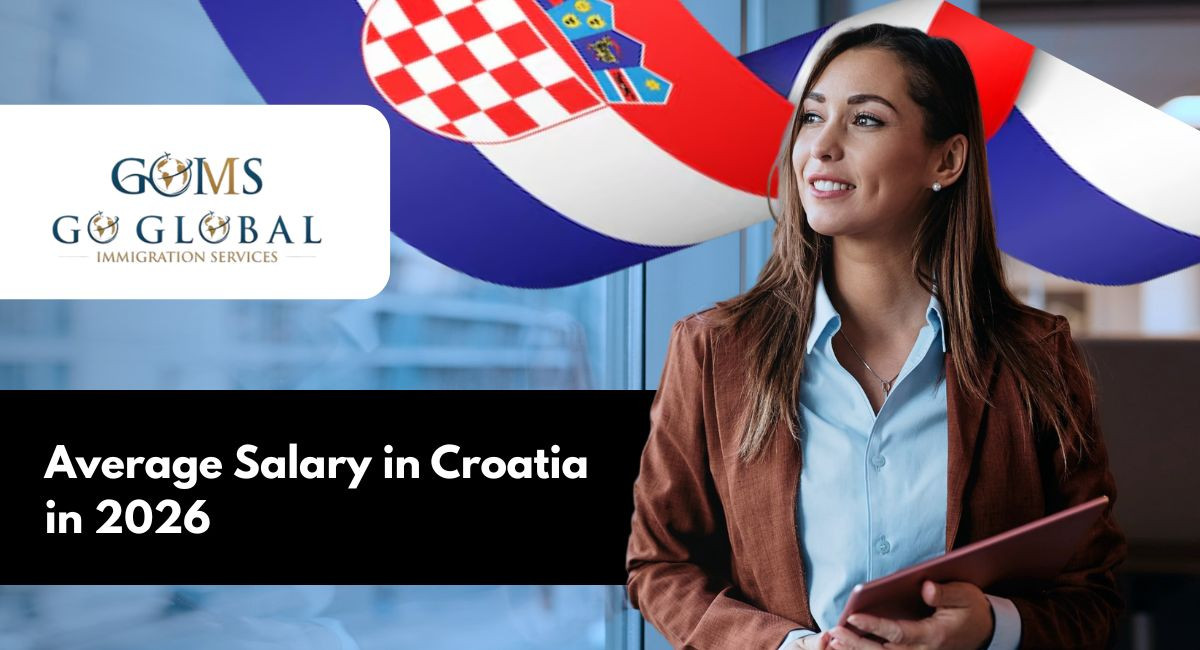The average salary in Croatia in 2026 ranges between €1,200 and €1,500 per month. However, this figure isn’t fixed; it can vary widely depending on your profession, city of residence, years of experience, and industry. For professionals relocating to Croatia or assessing career opportunities, understanding salary benchmarks across cities and sectors is key to making informed decisions.
The Average Salary in Croatia Varies by Cities
Major cities like Zagreb and Rijeka offer higher average wages compared to smaller towns, largely due to the presence of multinational firms, stronger industrial infrastructure, and a more developed service economy. Below is a comparison of average annual salaries across Croatian cities in 2026:
Average Salaries in Croatia by Job Role
Croatia’s job market is shaped by the European Union (EU) economy, with increasing demand in IT, healthcare, engineering, and tourism. Here’s how monthly salaries break down by profession in 2026:
Average Salary in Croatia After Tax
The average salary in Croatia after tax typically ranges from €950 to €1,300 per month, once income tax (20–30%), pension contributions (20%), and health insurance (16.5%) are deducted, making it a cost-effective destination for mid-level professionals within the EU.
Despite the deductions, net earnings in Croatia offer a decent standard of living, especially when compared to Western Europe’s higher expenses.
What is the Minimum Wage in Croatia?
As of 2026, the gross minimum wage in Croatia stands at €840 per month, while the net minimum wage is approximately €670. This base wage is set by the government annually and applies across all regions. However, sectoral agreements may offer higher minimums, depending on the outcome of union negotiations.
What is a Good Salary in Croatia?
A good salary in Croatia allows for comfortable urban living with some discretionary income. For a single person, average monthly expenses (including rent, groceries, transportation, and leisure) total around €900–€1,100. Hence, a net income above €1,500 per month is generally considered good, especially in Zagreb, where living costs are slightly higher.
Key Growing Industries in Croatia
Croatia’s economy is increasingly driven by innovation, EU-backed infrastructure, and tech startups. Some of the fastest-growing and well-paying sectors include:
Information Technology (IT) & Software Development
Healthcare & Pharmaceuticals
Engineering & Construction
Finance & FinTech
Hospitality & Tourism1
Renewable Energy
Logistics & Maritime Transport
Education & E-learning Services
Note: These sectors are actively hiring skilled professionals, including international talent, especially in tech and engineering.
Average Salary in Croatia According to Experience Level
Experience level has a direct impact on your earning potential in Croatia. Below is a breakdown by seniority:
Benefits in Croatia
Croatia’s employment system offers a range of employee protections and social benefits. Professionals working in the formal sector can expect:
Universal Healthcare Coverage
Pension Contributions
Paid Annual Leave (20+ days)
Sick Leave & Maternity Leave
Unemployment Insurance
Workplace Safety Protections
EU Mobility & Work Rights
In addition, Croatia’s EU membership allows easier job transfers and recognition of qualifications across Europe, making it an attractive destination for skilled professionals from India and beyond.
Reasons Why Croatia Attracts International Professionals
EU Membership Benefits
Croatia’s EU status offers skilled professionals easier mobility, legal protections, and access to broader European job markets.
Growing Tech & Tourism Sectors
Rapid growth in IT and tourism is driving demand for international talent, especially in seasonal and high-skilled roles.
Lower Cost of Living
Compared to Western Europe, Croatia offers affordable housing, food, and lifestyle—ideal for professionals on a budget.
English-Friendly Environment
English is widely spoken in workplaces, especially in tech and tourism, easing adaptation for foreign workers.
Relaxed Coastal Lifestyle
A scenic Adriatic coastline, Mediterranean weather, and a slower pace of life attract those seeking work-life balance.
Digital Nomad Visa Option
Remote workers can stay in Croatia for up to 12 months, tax-free, under a simple digital nomad visa.
Shortage of Skilled Workers
Croatia actively seeks international professionals in healthcare, IT, engineering, and skilled trades.
Simple Residency Routes
Residency permits for work, business, or freelancing are straightforward and welcoming for non-EU migrants.

